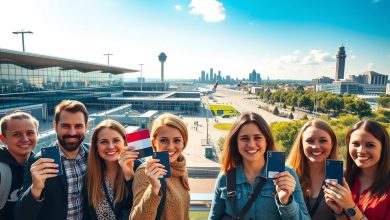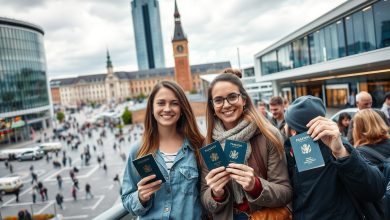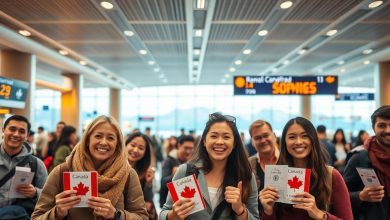Living La Dolce Vita: Step-by-Step Guide to Achieving Visa Sponsorship in Italy
Anúncios
Dreaming of a career abroad? With its rich culture and booming job market, this Mediterranean hotspot is attracting global talent.
In 2023, the government expanded work permits to 82,705 for non-EU nationals—a golden opportunity for skilled professionals.
Anúncios
The process might seem complex, but this guide breaks it down. From job hunting to securing a permesso di soggiorno, each step is simplified. Recent updates, like adjusted 2025 fees and EU Blue Card reforms, make the journey smoother.
For Nigerians, it’s more than a job—it’s a gateway to Europe. Competitive salaries, healthcare access, and cultural immersion await. Ready to turn dreams into reality? Let’s begin.
Understanding Italy Visa Sponsorship and Its Importance
Navigating foreign employment regulations can be daunting, but understanding sponsorship simplifies the path. This system allows companies to hire talent from outside the EU by securing a Nulla Osta—a work permit authorization. Employers take the lead, handling legal steps while candidates focus on qualifications.
Anúncios
What Is Visa Sponsorship in Italy?
Sponsorship begins when an employer proves no EU candidates fit the role. They submit a Nulla Osta application to Italian authorities, detailing the job offer and labor market demand. Once approved, the candidate uses this to apply for entry.
Recent 2025 reforms streamline the process. EU Blue Card holders can now work while awaiting residence permits, reducing delays. This benefits highly skilled professionals in fields like engineering or IT.
Why Employers Sponsor Foreign Workers
Companies sponsor talent to fill critical skill gaps. Sectors like healthcare and tech face shortages, making foreign hires essential. Employers gain access to specialized expertise and diverse perspectives, boosting innovation.
Sponsorship also offers long-term stability compared to self-sponsored visas. With validated contracts and approved permits, both parties benefit from clearer career opportunities.
Types of Italian Visas Available for Sponsored Employment
Different permits cater to various professional needs and durations of stay. The country offers three primary visa types for sponsored workers: short-term Schengen, long-term National, and the EU Blue Card. Each has distinct rules, fees, and benefits.
Short-Term Schengen Visa (Category C)
This permit allows stays up to 90 days within 180 days. Ideal for business meetings or training, it costs $96.60. However, it doesn’t authorize full-time employment.
Processing takes about 15 days. Nigerians must authenticate documents through the Italian embassy. Note: Overstaying risks future applications.
Long-Term National Visa (Category D)
Valid for 91–365 days, this work visa italy costs $124.50. It converts to a permesso di soggiorno after arrival, enabling longer stays.
Approval takes 30+ days. Applicants need proof of €30,000 insurance coverage. Nigerian professionals often use this for tech or healthcare roles.
EU Blue Card for Highly Skilled Workers
Targeting experts, this option requires a degree and a salary 1.5x Italy’s average. Benefits include family reunification and EU-wide mobility.
2025 updates simplified renewals. Nigerians in engineering or IT sectors benefit most. Financial benchmarks ensure stability.
Eligibility Criteria for Italy Visa Sponsorship
Meeting the right criteria is the first step toward securing work authorization abroad. Nigerian applicants must fulfill general conditions, submit verified paperwork, and demonstrate language or skill proficiency. Each requirement ensures candidates align with local labor needs.
General Requirements for Nigerian Applicants
A valid passport with six months’ validity and three blank pages is mandatory. Recent updates also require police clearance certificates, processed through the Nigerian Criminal Records Office. Some roles demand higher income thresholds, so candidates should verify financial benchmarks.
Educational certificates must be legalized by the Italian embassy. For healthcare or teaching positions, B1 Italian proficiency is now compulsory under 2025 rules. Sector-specific tests like CELI validate language skills for education roles.
Key Documents You’ll Need
The checklist includes a Nulla Osta, flight itinerary, and codice fiscale (tax code). Bank statements proving financial stability and proof of accommodation are equally critical. Certified Italian translations of academic records expedite processing.
Medical requirements include TB tests and updated vaccination records. Nigerian applicants should prepare these documents early to avoid delays. Missing items risk rejection, so double-check every detail.
Language and Skill Proficiency Expectations
While English suffices for tech roles, Italian fluency boosts opportunities. Employers often test technical skills during interviews. Fields like engineering prioritize certifications or portfolios.
For non-EU hires, the application process rewards preparation. A well-organized file with all requirements increases approval odds. Start compiling paperwork months ahead to meet deadlines.
How to Secure a Job with Italy Visa Sponsorship
Breaking into the international job market requires strategy and preparation. Nigerian professionals can leverage high-demand sectors and tailored applications to stand out. With 38% of nurses in the country being foreign-born, opportunities abound for skilled talent.
Top Industries Hiring Sponsored Foreign Talent
Healthcare leads with critical shortages, especially in nursing roles. Tech sectors like AI and renewable energy, particularly solar engineering, also seek expertise. Milan’s tech hub reports a 22% success rate for Nigerian applicants in 2024.
Bilateral programs, such as MAECI scholarships, bridge gaps for qualified candidates. These initiatives often fast-track employment offers in partner institutions.
Effective Job Search Strategies for Nigerians
Platforms like LinkedIn Italy and InfoJobs list verified openings. Networking through Nigerian professional associations abroad can uncover unadvertised roles. Avoid overstating qualifications—employers value transparency.
“Cultural fit matters as much as skills. Tailor your approach to Italian workplace norms.”
Crafting an Italian-Style CV and Cover Letter
Local resumes include a photo, birthdate, and codice fiscale. The Europass format is standard, but some firms prefer handwritten applications. Marital status and nationality are typically listed.
Cover letters should highlight adaptability and language skills. Fluency in Italian boosts chances, even for English-centric roles like IT. Proofread meticulously—errors can derail an otherwise strong job offer.
Step-by-Step Italy Visa Application Process
The journey from job offer to work authorization involves clear steps. Nigerian applicants must follow a structured timeline, from employer-initiated permits to consulate interviews. Meticulous preparation avoids common pitfalls, especially with 2025’s tightened contract checks.
From Job Offer to Work Permit (Nulla Osta)
Employers start the process by applying for a Nulla Osta at local immigration offices. Approval takes 4–8 weeks, depending on regional backlogs. The 2025 reforms require additional proof of salary compliance with sector benchmarks.
Nigerian candidates must legalize academic certificates through the Italian embassy in Lagos. This includes notarized translations and Hague Apostille stamps. Missing this step delays the entire visa application.
Submitting Your Visa Application
Once the Nulla Osta arrives, applicants book slots via VFS Global. Lagos consulate processing averages 10–12 weeks. Required items include:
- Biometric data (fingerprints)
- Authenticated employment contract
- Proof of €30,000 health insurance
“Double-check translations. Even minor errors trigger rejections.”
Navigating Consulate Interviews
The italian embassy consulate focuses on contract authenticity. Prepare for scenario-based questions like, “Describe your daily tasks.” Nigerians often face rejections for incomplete financial proofs or mismatched job descriptions.
Post-approval, verify the visa sticker’s details (dates, employer name). Errors require immediate correction through consulate documentation channels. Emergency contacts are listed on the Lagos consulate’s updated 2025 portal.
Preparing for Relocation and Life in Italy
Settling into a new country involves more than just paperwork—it’s about adapting to a whole new way of life. For Nigerian professionals, this means tackling legal formalities, understanding cultural nuances, and setting up essential services. With the right preparation, the transition can be seamless.
Legal Steps After Arrival (Permesso di Soggiorno)
Within eight days of arrival, applicants must apply for a permesso di soggiorno at local Questura offices. The process requires:
- A completed kit from Poste Italiane (€30 fee)
- Passport, work permit, and proof of address
- Four passport-sized photos
Processing takes 1–3 months. Delays are common, so keep copies of all documentation. Nigerian diaspora groups in Rome or Bologna often assist with translations.
“Always request a receipt from the Questura. It serves as temporary proof while awaiting your physical permit.”
Cultural Integration Tips for Nigerians
Workplace etiquette differs significantly. Italians value punctuality for meetings but may start events late. Handshakes are firm, and titles like Dottore (for degree holders) are respected.
Join Yoruba-Italian language exchange groups to ease communication. Northern cities like Milan have harsh winters—invest in thermal wear early.
Managing Finances and Healthcare
Open a PostePay or Wise account for easy transactions. Register with the SSN (Servizio Sanitario Nazionale) for healthcare access—equivalent to Nigeria’s NHIS but covers pre-existing conditions.
For remittances, apps like OPay offer low-cost transfers to BancoPosta. Always compare exchange rates to maximize savings.
Conclusion
Securing work abroad opens doors to new opportunities and growth. With a 72% success rate for Nigerian applicants in 2024, the process is more accessible than ever. This guide simplifies the journey—from the Nulla Osta to the permesso di soggiorno.
Leverage upcoming 2025-2026 quota expansions for better chances. Always use official channels like the Italian Ministry of Foreign Affairs. Avoid unauthorized consultants—scams can derail dreams.
Before departure, check essentials: medical tests, currency exchange, and expat networks. Stories of Nigerians thriving in Milan prove it’s achievable. Stay informed, stay prepared, and embrace the adventure ahead.
For more information explore the official visa website mentioned in this article:
You will be redirected to another website
FAQ
What is visa sponsorship in Italy?
It is a process where an employer supports a foreign worker’s application to legally work and reside in the country. The sponsor ensures the applicant meets all legal requirements.
Why do employers in Italy sponsor foreign workers?
Companies sponsor skilled professionals to fill talent gaps in industries like tech, healthcare, and engineering. It helps them access a global workforce with specialized expertise.
What are the main types of work visas available?
The Short-Term Schengen Visa (Category C), Long-Term National Visa (Category D), and EU Blue Card are common options. Each serves different employment durations and skill levels.
What documents are required for Nigerian applicants?
Essential paperwork includes a valid passport, job offer letter, proof of qualifications, and financial stability. Additional documents may be requested by consular officials.
How can Nigerians find sponsored jobs in Italy?
Networking on LinkedIn, applying through Italian job portals, and targeting industries like IT or healthcare improve chances. Tailoring resumes to local standards is crucial.
What is the Nulla Osta, and why is it important?
This work permit authorization, issued by Italian authorities, confirms job eligibility. It’s a mandatory step before applying for a visa at the consulate.
What should applicants expect during the consulate interview?
Questions often focus on job details, qualifications, and intent to return after the visa expires. Clear, honest responses strengthen the application.
How long does it take to get a Permesso di Soggiorno after arrival?
Processing usually takes 1–3 months. Applicants must submit fingerprints and paperwork at a local immigration office within 8 days of entering.
Are language skills mandatory for all work visas?
While Italian proficiency isn’t always required, basic knowledge aids integration. Some roles, especially in healthcare or education, may demand fluency.
Can family members join sponsored workers in Italy?
Yes, dependents can apply for family reunification visas after the primary applicant secures a long-term work permit.
Published on: 8 de June de 2025








